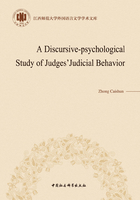
1.4 Research Questions
DP draws on the literal use of the concept of “conversation” as a guide to building working models of psychological phenomena(Harre,2001).Conversation is a complex social episode,with its own rules and conventions.Thus,DP's major task is to discover the aims and norms of collective joint actions that constitute the episodes.In this light,the practical DP research shall focus on episodes that people participate in and come up with dynamic models of their joint actions.To achieve this,we need to know what acts people perform to accomplish the overall project of episodes.In order to capture the unfolding of those episodes and sequence of acts,close attention must be paid to the dynamics of the participants' positioning,a momentary assumption or ascription of a certain cluster of rights,duties,and obligations with respect to what participants,in that position,can say and do.In short,a discursive psychology is “to bring out the‘semantics' of actions and the‘syntax’of their building up into intelligible episodes”(Harre,2001:703).Following this paradigm,this study will be centered on the following three questions:
1)What do judges do when they participate in the judicial process?
A discursive psychology of JJB moves beyond the inner mind of judges to the interactional,social and cultural dimensions of the discursive process in which all the components of JJB are constituted.This suggests that judicial behavior research shall take a fine-grained look into how judicial behavior is constituted and constructed within the “everyday” talk at the localised and situated level of the judicial proceeding.That is,empirical analysis must first accomplish the task of identifying and describing some of the detailed discursive strategies and activities deployed by judges to achieve judicial undertakings.The discourse analysis for DP can address what discourse practice judges are engaged in and what tools(i.e.discursive resources)they make use of to accomplish them.
2)What enables judges to behave the way as they do?
In order to understand the unfolding of those episodes in which judicial justice is sealed,close attention must be paid to the dynamics of judicial interaction.In accordance with the agentic framework of DP,we need to understand what judges must know to produce a sequence of acts that accomplish the judicial activities and how judges' decision making is linked to such knowledge.In DP,the notion of “identity”(Antaki & Widdicombe,1998a),“role” and “positioning”(Harre,2001)are introduced to describe how actions are associated with certain persons as role holders.That is,the knowledge that participants utilize is attributable to their identity.Different from cognitive psychology,identity is treated in DP as the “tool” and “achievement” in discourse practice(Antaki & Widdicombe,1998b).DP emphasizes the ephemeral character of identity which can be challenged,transformed,repudiated,exploited,expanded,and so on.This suggests that a discursive psychology of JJB shall reveal how judges orient to particular identities to perform their specific tasks.By addressing judges' identity,we shall also be able to show the stake or interest that judges display in JJB.
3)How is judges' behavior held accountable?
One remarkable feature of people in social interaction is that they do not only act on others but also attend to the accountability of their own agency.The latter has been a major theme in DP.DP assumes that the way discursive accounts are constructed is significant to our understanding of the concerned social behavior,for they embrace interpretive and justificatory elements.By investigating the accountability of JJB,we are able to see how judges claim about the meanings of their discursive actions and their assertions of the relevant norms and how the legitimacy and warrantability of their behavior is managed.
However,accounting is itself a form of hierarchical social action(Harre,2001),for it always implies another level of accountability.Put in another way,the participants also hold accountable for their act of accounting.This raises the question of the closure of accounting hierarchies.For this,Taylor's(1989)answer is the participants' “existential” declarations while Wittgenstein(1997)reduces it to the form of life that the participants inhabit.In this light,the discursively oriented social psychological study of social behavior shall be expanded to incorporate social,cultural and biographical information about the participants.In our case,we need to understand judges' way of life so that their judicial behavior can be construed.
[1] They are Civil Procedure Law(1982/1991),Criminal Procedure Law(1996)and Administrative Procedure Law(1989).
[2] Social psychology can be simply defined as “the study of certain kinds of interaction between people” .